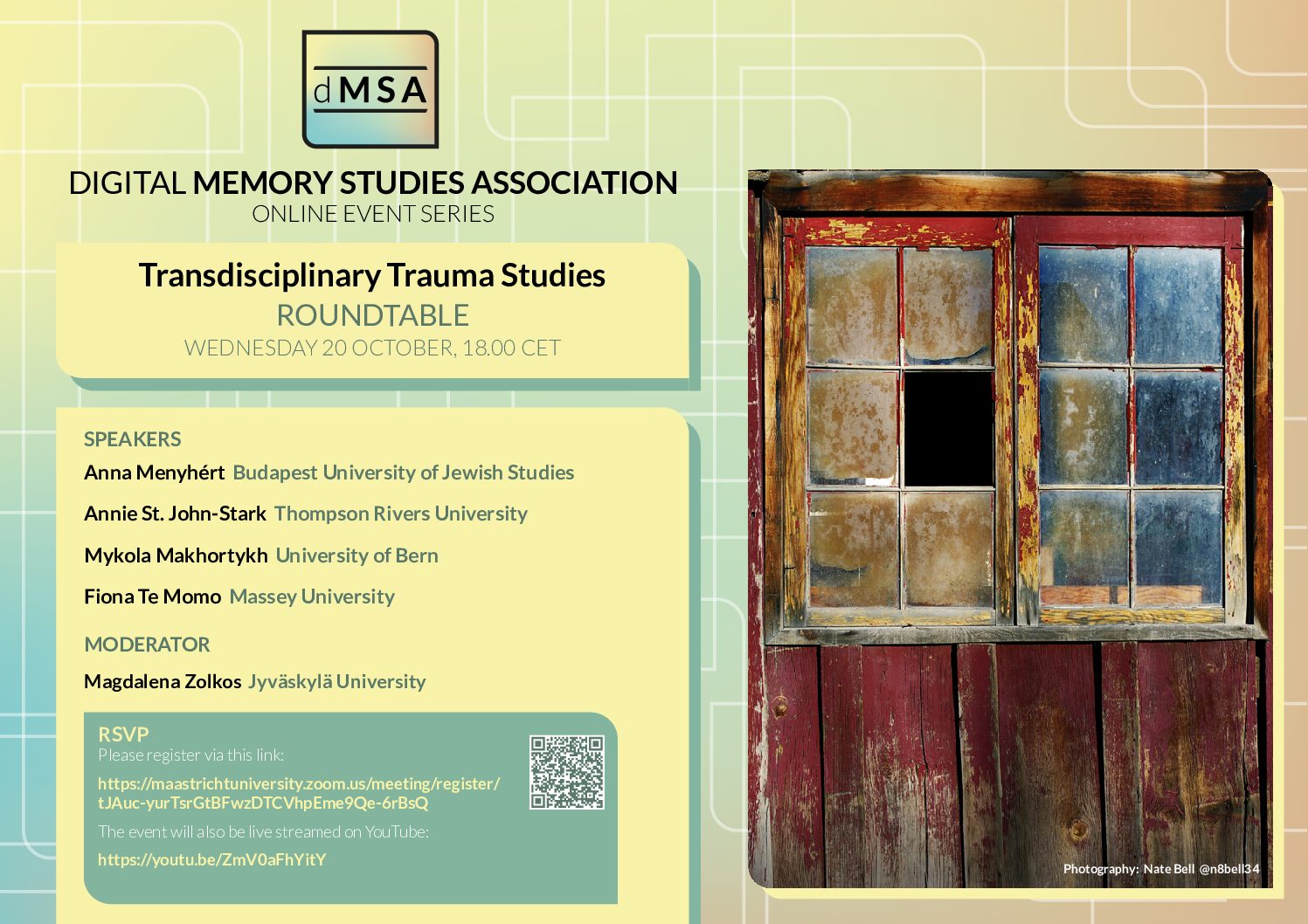Details
At: 20/10/2021 6:00pm, in cooperation with:
Speakers:
Anna Menyhért, Budapest University of Jewish Studies
Annie St. John-Stark, Thompson Rivers University
Mykola Makhortykh, University of Bern
Fiona Te Momo, Massey University
Transdisciplinary Trauma Studies, hosted by: Magdalena Zolkos, Jyväskylä University
Trauma studies is a fast-growing field that combines threads from disciplines ranging from memory studies and psychology to cultural studies and media studies. The event briefly introduces a new book series, Transdisciplinary Trauma Studies at De Gruyter, co-edited by Anna Menyhért, Annie St- John-Stark and Anna Menyhért; this is followed by a round table discussing different perspectives on trauma studies, as well as the conceptual and methodological challenges of establishing trauma studies as a hub discipline. It will bring together four speakers pursuing trauma research from different disciplinary perspectives: media studies and cultural studies (Trauma and Social Media; Anna Menyhért), psycholinguistics and history (Trauma and the Heroic; Annie St. John-Stark) information retrieval and data science (Trauma and Information Retrieval; Mykola Makhortykh), indigenous studies and postcolonial studies (Trauma and Indigenous Healing; Fiona Te Momo).
Panelists
Anna Menyhért is a Professor of Trauma Studies at the Budapest University of Jewish Studies. In 2020-2021 she was a Research Fellow at the Wiesenthal Institute for Holocaust Studies in Vienna, and a visiting professor at the University if Florence. Between 2016–2018 she was a Marie Sklodowska-Curie Research Fellow at the University of Amsterdam. Previously she led the Trauma and Gender in Literature and Culture Research Group at Eötvös Loránd University in Budapest. She is the author of five monographs, among them ‘Women’s Literary Tradition and Twentieth-Century Hungarian Women Writers’ (Brill, 2020). Her book entitled ‘Trauma in the Digital Age: The Representation, Transmission and Processing of Trauma on Social Media’ will be published in 2022 at De Gruyter. She is the co-editor of the book series Transdisciplinary Trauma Studies (De Gruyter), and co-chair of the Memory and Trauma Working Group in the Memory Studies Association.
Annie St. John-Stark is Assistant Professor in History in the Department of Philosophy, History and Politics at Thompson Rivers University in Kamloops, British Columbia, co-editor of the new book series Transdisciplinary Trauma Studies (De Gruyter Press), and co-chair of the Memory and Trauma Working Group in the Memory Studies Association. Her research focus ranges across trauma and catastrophe in British, European and American history, combatant and veteran experiences and survival from the 17th century to the 19th, and the role of conscience and self in identity formation for males in 17th-century British society. These foci continue to drive a multi-discipline approach, particularly involving the respective methodologies of memory studies and trauma studies, within fields of sociology, literary analysis, and psychology.
Mykola Makhortykh is a postdoctoral researcher at the Institute of Communication and Media Science at the University of Bern, where he examines how trauma- and memory-centered information behavior is affected by online platforms and information retrieval systems. To achieve this goal, he combines traditional social science methods (e.g., content analysis and focus groups) with novel computational approaches (e.g., deep learning and agent-based testing). His other research interests include artificial intelligence, trauma and memory studies, in particular digital Holocaust remembrance, armed conflict reporting, cybersecurity and critical security studies, and bias in information retrieval systems. He is the co-editor of the book series Transdisciplinary Trauma Studies (De Gruyter).
Fiona Te Momo is an associate professor who lectures in the School of Māori Knowledge (Te Putahi-a-Toi) at Massey University (Te Kunenga ki Pūrehuroa). She descends from the tribes Ngāti Raukawa, Ngāti Porou, and Ngāti Konohi. Her discipline is Development Studies and for decades she has focused researched in Māori Development that embodies Māori Economic Development, Māori Educational Development, Māori Political Development, and Māori Social Development. These areas of research expertise cover Community Development, Cultural Knowledge, Indigenous Development, Iwi Resource Management, Māori Land, Māori Perspectives of Biotechnology, Māori Social Science Practice, Māori Student Recruitment and Retention, Māori Social Work, Māori Voluntary Work, Social Justice, and Whānau Development. She locates the Whānau, family, at the heart of her research and continues to investigate how they developed holistically pre-colonisation, post-colonisation, and embrace the future because as a grandmother she believes our earth, the way we treat it and each other is the value of knowledge Indigenous people bring to an academic world stage.
Moderator
Magdalena Zolkos is Humboldt Research Fellow at the Frankfurt Memory Studies Platform (2019-2021) of the Goethe-University in Frankfurt and Associate Professor at the Department of Social Sciences and Philosophy at Jyväskylä University. She has researched historical trauma in culture and society in Europe and in Asia-Pacific. Her current research topic is on the repatriation of Indigenous culture heritage from European museums to communities of their origin and custodianship. She is the author of two books: Restitution and the Politics of Repair: Tropes, Imaginaries, Theory (Edinburgh University Press, 2020) and Reconciling Community and Subjective Life. Trauma Testimony as Political Theorizing in the Work of Jean Améry and Imre Kértesz (Bloomsbury, 2010). She is also co-editor of Contemporary Perspectives on Vladimir Jankélévitch: On What Cannot Be Touched (Lexington, 2019).
